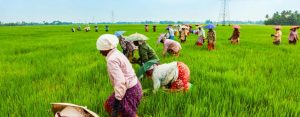By Onome Amuge
The Institute for Agricultural Research (IAR) at the Ahmadu Bello University (ABU), Zaria, has begun a research into the development of maize varieties that can withstand flood and survive while submerged in water for up to 14 days.
Muhammad Ishiyaku, the institute’s director, noted that one of the fundamental focus areas of genetic improvement programmes of the institute is to develop crop that could withstand drought and flood.
He added that the IAR had started the first phase of the experiment and assured that when the institute eventually identifies the flood endurance of the selected lines, it would be used in its breeding programmes.
Climate change, according to the professor of agriculture, is an undeniable natural phenomenon and the development of the flood resistant maize variety would help ameliorate the effect of flood on farmers’ investments.
Ishiaku also stated that toward the end of 2020, the institute released six improved varieties of maize as well as multiplied and released new improved varieties of cowpea for some seed companies to start marketing.
According to him, the release of these improved varieties were geared toward strengthening food security in the country in face of the global public health and security challenges in some parts of the country.
He added that the improved seeds were drought and insects’ resistant and high yielding, providing eight tonnes per hectare whereas the previous seeds provided between five and six tonnes per hectare, a remarkable achievement compared to previous yields that were much lower.
Ishiyaku further disclosed that the Federal Ministry of Agriculture and Rural Development was engaging the institute to produce the required cotton seeds to enable farmers get adequate seeds for wider hectares.
He expressed disappointment over the swindling of the cotton farmers in the country over the previous years. This, he explained, was as a result of lower demand for the commodity by the textile industries and unattractive international prices being offered them.
He noted that unlike other crops which can be consumed, cotton has only one area of utilisation, which is the textile industry.
The IAR director enjoined the government to sustain its efforts on cotton production as it would lead to a reawakening in the demand for cotton in the textile industry, adding that with the right incentives, farmers would wake up and respond to the demand.
Ishiyaku said that IAR had developed 13 improved varieties of cotton seeds that could grow in different regions of the country.









